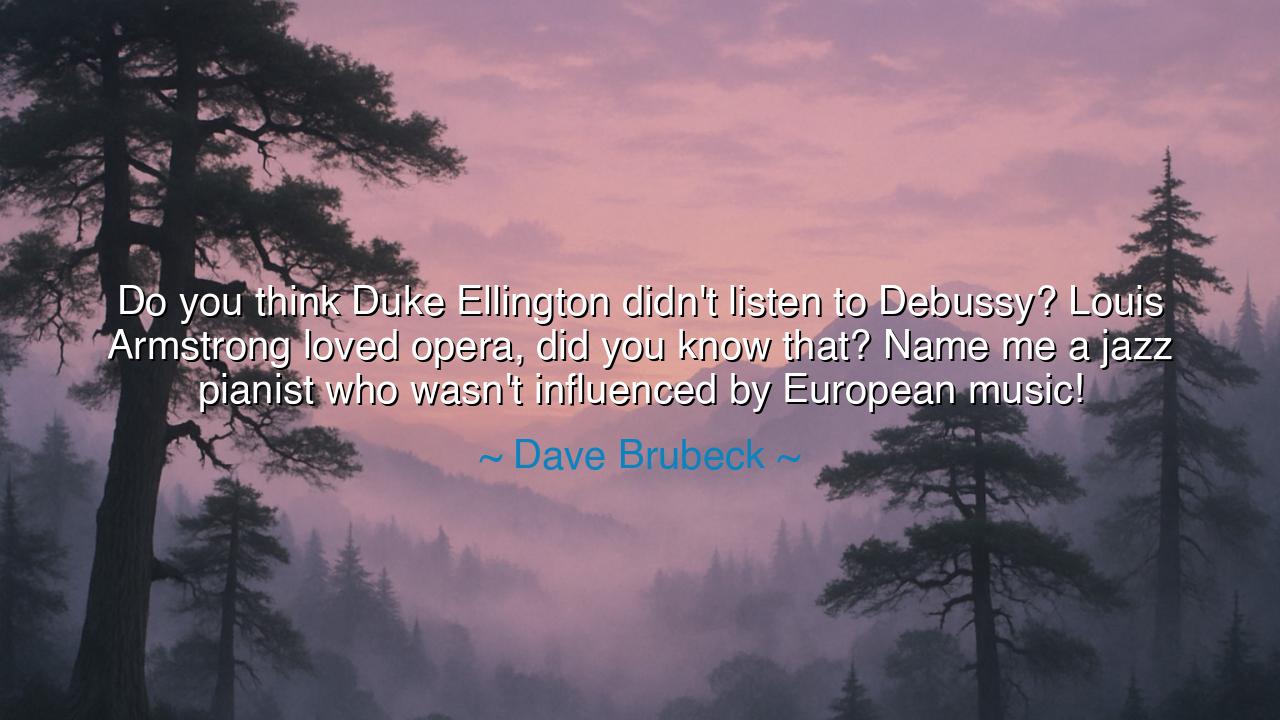
Do you think Duke Ellington didn't listen to Debussy? Louis
Do you think Duke Ellington didn't listen to Debussy? Louis Armstrong loved opera, did you know that? Name me a jazz pianist who wasn't influenced by European music!






Hear the words of Dave Brubeck, a prophet of rhythm and harmony: “Do you think Duke Ellington didn’t listen to Debussy? Louis Armstrong loved opera, did you know that? Name me a jazz pianist who wasn’t influenced by European music!” In these words, he unveils a truth that the wise of every age have known: that no art, no soul, no people stand alone. Every note, every style, every creation is a river fed by countless streams. To deny this is to deny the very flow of history itself.
For consider, O listener, how jazz, that fire-born music of America, rose from the cry of the oppressed and the triumph of the human spirit. Its roots sank deep in African rhythms, its blossoms stretched toward the skies of freedom. And yet, as Brubeck reminds us, its branches drew nourishment from the winds of Europe. The bold chords of Debussy, the lush harmonies of Ravel, the structure of Bach—they were not distant, but present, woven into the fabric of this new music. Thus, in jazz, Africa and Europe met, clashed, and embraced, creating something the world had never before known.
Let us recall a tale that makes this truth shine. Louis Armstrong, the very heartbeat of jazz, whose trumpet could both thunder and weep, was no stranger to the grand halls of opera. He loved the soaring arias, the cries of Verdi, the tenderness of Puccini. And he did not merely admire them from afar—he let them seep into his phrasing, his tone, his timing. Listen closely, and in his trumpet’s wail, you will hear not only the blues of New Orleans but also the echoes of Europe’s great stages. From this union was born a sound that could both speak to the pain of the streets and rise to the majesty of eternity.
So too with Duke Ellington, that sovereign of swing. He drew upon Debussy’s impressionism, painting with tone colors, layering textures that seemed to shimmer like water in the moonlight. His orchestras were not mere bands, but symphonies of smoke and brass. Ellington understood what Brubeck here declares: that genius does not wall itself in but gathers from every corner, weaving all into a garment both rich and new. His music proves that the greatest strength is not purity of origin, but courage in blending, in listening, in transforming.
The lesson, O children of tomorrow, is radiant: do not believe the lie of separation. Just as there is no jazz pianist untouched by European music, so too there is no thinker, no creator, no soul untouched by the currents of others. To create is to listen; to grow is to borrow, transform, and return with something greater. Those who insist on standing apart wither. Those who embrace the mingling of cultures, voices, and histories, become eternal.
What then must you do? First, become listeners. Do not scorn the influences of others, nor cling so tightly to your own roots that you suffocate them. Instead, let your roots drink from every soil. Read widely, hear deeply, walk among many peoples. Let the opera of Europe, the jazz of America, the chants of Africa, the ragas of India, all find their way into your soul. In this mingling, you will not lose yourself—you will find yourself more fully.
And above all, let your life be a harmony, not a single note. Take from your ancestors their strength, from your neighbors their wisdom, from strangers their inspiration. Weave them into the music of your days, until your life itself becomes a composition greater than the sum of its parts. For Brubeck’s words are not about music alone—they are about existence itself. No one stands alone. All creation is communion. All greatness is born of influence.
Thus, remember: to be original is not to be untouched, but to touch the world so deeply that from many voices arises one song—your own.






AAdministratorAdministrator
Welcome, honored guests. Please leave a comment, we will respond soon